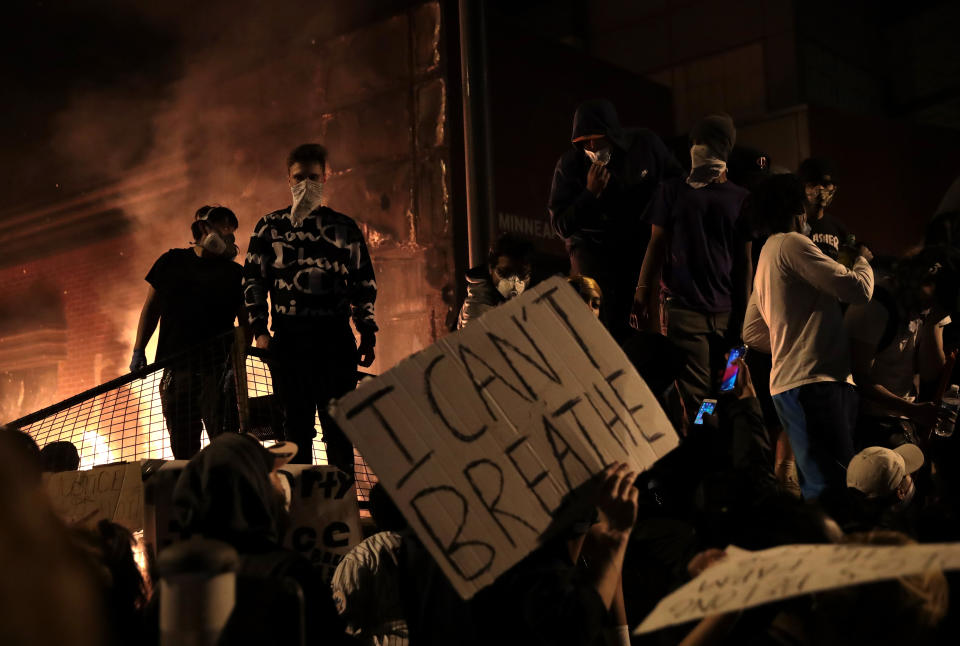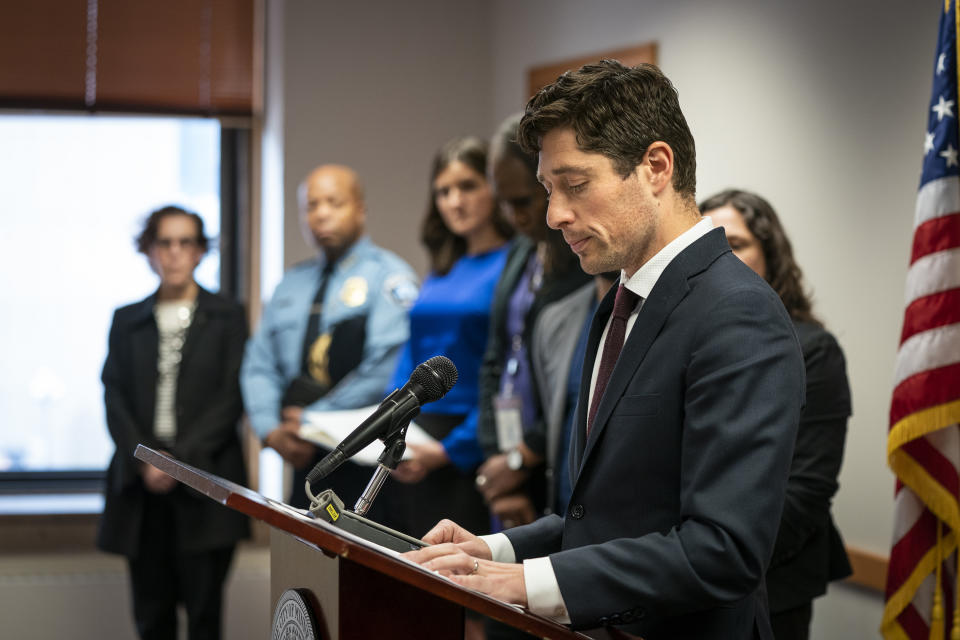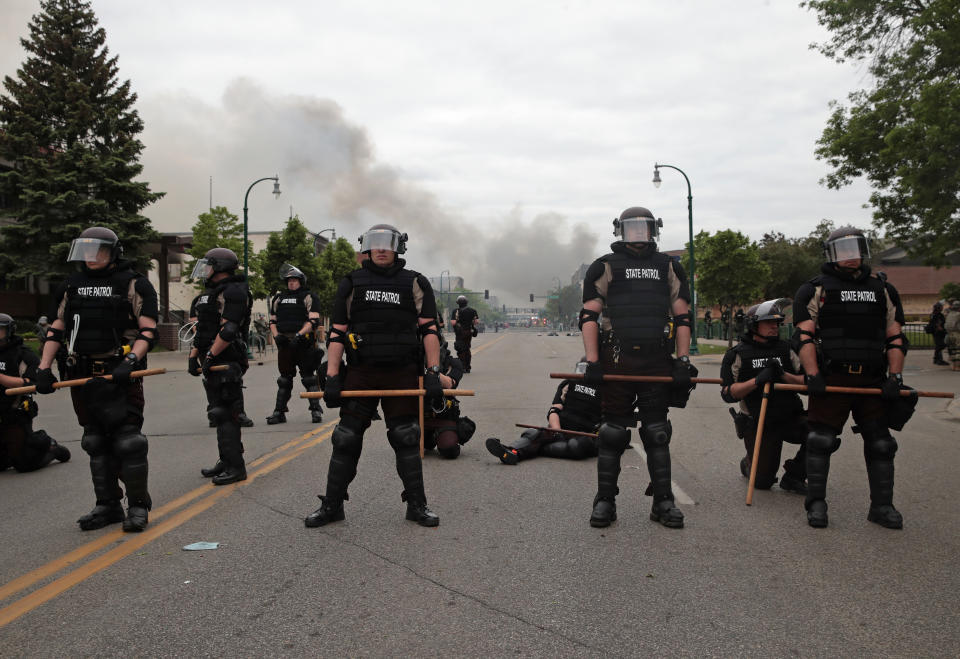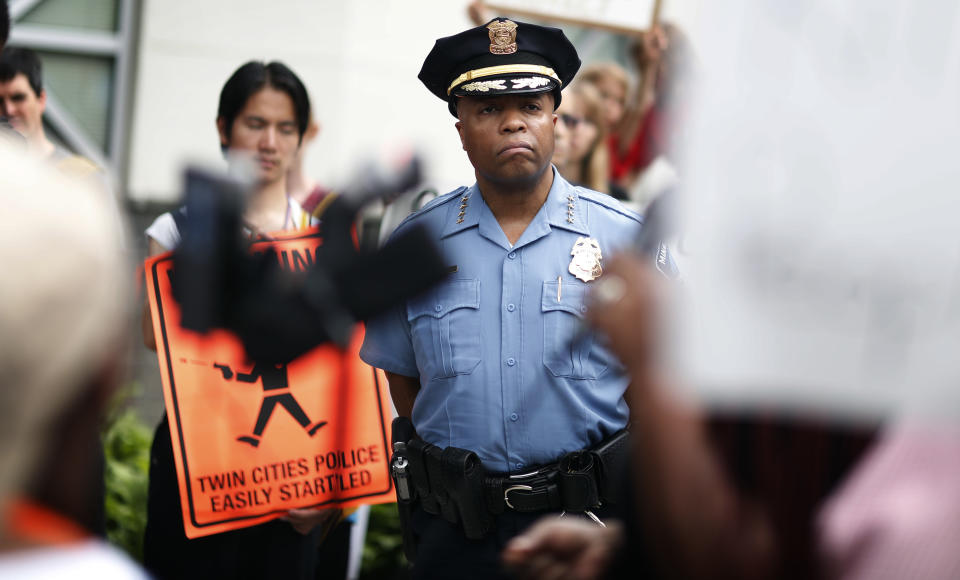Minneapolis mayor and police chief deal with a crisis years in the making
The city of Minneapolis is under siege after five nights during which thousands of protesters have been marching in the streets, demanding justice in the name of George Floyd and clashing with local and state police and, since Friday, National Guard troops. Businesses have been looted, property has been destroyed by fires and camera crews have highlighted the nightly chaos for the world to see. The outrage is in response to the death of Floyd, an unarmed black man who was held down by four Minneapolis officers, including one seen on video kneeling on his neck for more than eight minutes.
That officer, Derek Chauvin, was arrested Friday and charged with murder, a key demand of the protesters. All four of the officers were fired from the force the day after Floyd’s death, last Monday.
But activists are pressing for Chauvin to be indicted, the next step in the criminal justice process, and for the arrests and indictments of the other three officers as well.
The incident, and the nights of unrest that followed, have called attention to the often troubled history of relations between police and African-American residents in Minneapolis, a Democratic-dominated city in a traditionally progressive state. The district where Floyd died is represented by Rep. Ilhan Omar, a firebrand Democratic freshman from a large community of Somali-Americans who have settled there.
“Former Officer Chauvin's actions were horrific,” Minnesota Gov. Tim Walz tweeted Friday. “His arrest is a good first step toward justice for George Floyd. But it doesn’t change the systemic problems and persistent inequities that led to his death or the pain our communities live with every day. We’re committed to change.”

On Thursday, the U.S. Justice Department announced it had made the federal investigation into Floyd’s death a “top priority.” In a joint statement, U.S. Attorney Erica Macdonald and FBI special agent in charge Rainer Drolshagen also promised a “robust criminal investigation.”
Walz’s mention of “systemic problems and persistent inequities” reminded observers of previous episodes of controversial actions by police that led to demonstrations and promises of change, including by the current mayor, who was elected on a platform of police reform.
In November 2015, two white Minneapolis police officers killed 24-year-old Jamar Clark, a black man, as they tried to arrest him after a fight at a party. There were differing accounts of the circumstances, but in the end neither officer was charged. The killing set off protests outside a local police precinct that lasted 18 days.
In July 2016 in nearby St. Anthony, Philando Castile, a black man, was shot to death in his car during a traffic stop by Officer Jeronimo Yanez, who is Hispanic. Castile, who was licensed to carry a firearm, informed Yanez that he was armed and was reaching for his driver’s license when Yanez shot him seven times at point-blank range through the open window of his car. Castile’s girlfriend, who was sitting in the passenger seat, with her four-year-old daughter in the back, filmed the incident on Facebook Live.
The killing set off protests in the Minneapolis community for more than two weeks. Yanez was charged with second-degree manslaughter, “the first time an officer has been charged for a fatal shooting in Minnesota in more than 200 cases that spanned over three decades,” according to an NPR account.
He was acquitted of all charges at trial.
In September 2017 Justine Damond, a white Australian woman, was killed by Minneapolis police officer, Mohamed Noor, who is black. Damond had called 911 about a suspected prowler, and Noor, who responded to the call with a partner, shot her in an alley in what he admitted was a mistake. He was convicted of third-degree murder and sentenced to 12.5 years in prison. Damond’s family settled a civil lawsuit with the city for $20 million. There were protests after this killing too, and a chain reaction of events that shook the city.
Then-Chief of Police Janeé Harteau was on vacation at the time of Damond's killing and stayed on vacation for four days instead of immediately returning home. After widespread criticism, she resigned and current Chief of Police Medaria Arradondo took her place.
That year Jacob Frey was elected mayor in large part on a promise of improving police-community relations.

Two city leaders, one black and one white, thrust into new positions to improve the relationship between the police and the community. The past week has shown how difficult it is to make systemic changes to a culture in which police close ranks around officers who are accused of wrongdoing. Chauvin, the officer charged in Floyd’s death, had 18 previous complaints against him.
The National Guard was called into the city on Thursday by the request of Mayor Frey, but received no direction on what to do. “We sort of knew what we might be doing as it related to civil disturbance in Minneapolis, but it’s very important we know exactly what we’re being asked to do so we have the right equipment, we mobilize the right number of soldiers,” Minnesota National Guard Adjutant Gen. Jon Jensen said. “That element was lacking.”
University of Minnesota political science professor Larry Jacobs told AP that the current unrest shows that Mayor Frey is “out of his depth.”
“[Frey] is clearly unable to understand what he has to do to restore order while also creating the kind of healing that has to happen in Minneapolis,” Jacobs said. “Until about a week ago, he looked to be on a glide path to reelection, and within a week, his mayorship looks like it’s crumbled.”
Minnesota House Minority Leader Kurt Daudt, a Republican, publicly questioned the mayor’s leadership. “The silence from the Governor and Mayor is deafening,” Daudt tweeted Friday. “There is no plan, there is no communication, and they are choosing to allow destruction and lawlessness over public safety.”

Arradondo and Frey, who did not return calls requesting comment, said they were “overwhelmed” on Friday.
“We have never in my 30 years experienced multiple events of high-risk civil unrest that included mass looting, indiscriminate arson with sounds of … gunshots, direct violence in confrontations with police, and all of these happening throughout our entire city,” Arradondo said at a Friday press conference. “These events over the last 72 hours absolutely overwhelmed our public safety response.”
Minneapolis activist Dave Bicking says that the police chief and mayor talk a good talk, but not much gets done. “The police chief got the position after the last police chief resigned,” Bicking, who is a board member for Communities United Against Police Brutality, told Yahoo News. “You talk to people in the black community and other leaders, you hear very little good within the police department. Other than body cameras, pretty much everything else has stayed the same.”
One of Arradondo’s first moves as chief of police was requiring Minneapolis officers to wear body cameras. But ultimately, Bicking says, Arrandaondo works for the mayor, who he claims “was not good on police accountability” while he was on the City Council.
“[Arradondo] works for the mayor and to some extent the City Council,” said Bicking. “The City Council has been uninterested in reforms … especially with accountability. [Leadership] is saying nice things, but this happened because they’ve been ignoring us. Until there is an actual change in action on the street we have not achieved our change and justice for George Floyd.”

In an impassioned speech on Friday, former Women’s March co-chair Tamika Mallory said black America was in a “state of emergency.”
“The reason why buildings are burning is not just for our brother, George Floyd,” said Mallory. “They’re burning down because people here in Minnesota are saying to people in New York, to people in California, to people in Memphis, to people all across this nation: Enough is enough.”
Mallory said the solution was to ensure that every incident of police misconduct is prosecuted. “There’s an easy way to stop it. Arrest the cops. Charge the cops. Charge all the cops — not just some of them, not just here in Minneapolis. Charge them in every city across America where our people are being murdered. Charge them everywhere. That’s the bottom line. Charge the cops. Do your job. Do what you say this country is supposed to be about, ‘the land of the free’ for all. It has not been free for black people, and we are tired.”
_____
Click here for the latest coronavirus news and updates. According to experts, people over 60 and those who are immunocompromised continue to be the most at risk. If you have questions, please refer to the CDC’s and WHO’s resource guides.
Read more from Yahoo News:



